Words MAXMILIAN WECHSLER Portrait photographs Jaran Lakkanawat
| THE government of the Republic of Armenia is fortunate indeed to have Mr Arto Artinian looking after their interests in Thailand. The Honorary Consul is remembered by many as the host of one of the best national day receptions held by any embassy last year – and being responsible for superbly designed 2014 Christmas and New Year greeting cards as well as a great website of the Consulate. More seriously, though, he plays an essential role in maintaining good relations with the Thai government and foreign diplomatic community. Last but not least, he spares no effort to assist Thais who want to visit Armenia. Mr Artinian’s approach to his Consular duties has a definite correlation to the way he runs a high-end jewellery manufacturing company in Bangkok. In this trade, everything depends on good design, precision and a sense for detail. Mr Artinian makes managing both endeavors simultaneously look easy. His splendidly decorated building on Silom Road, Soi 19, serves as both Consulate and the administrative section of his jewellery company. |
“A lot of people also ask me, ‘How can you manage to do all that in Thailand?’ I always say, by building good relationships, good teams and good management, and by having high expectations and standards. At my company we have built over the years this reputation for excellence in design and finished fine jewelry products. We are like a family here.”
Mr Artinian switched topics to talk about Armenia. “It is a mysterious country for many people. They want to know where we came from. We have a big diaspora outside our country. The reason is that the Republic of Armenia is only part of an ancient greater Armenia which extends to the west and is currently a part of Turkey. My ancestors came from this part. My grandparents were victims and survivors of the Armenian Genocide which began in 1915 during the days of the Ottoman Empire and were uprooted from their ancestral lands in western Armenia and deported,” said Mr Artinian, noting that this year is the centenary of the Armenian Genocide that left more than one and a half million Armenians dead or displaced.
“I was born to Armenian parents in Damascus, and spent my childhood in Damascus in Syria. My father was a hardworking, well-established and respected jeweler. After my elementary studies, I attended an Armenian boarding school in Cyprus and spent seven years in high school there and an additional two years studying business administration at Cyprus College [now the European University Cyprus].
“Following my graduation I returned to Damascus and decided to continue the family’s jeweler’s legacy, so I joined my father in the business. I travelled a lot. I often went to Antwerp, where my uncle was an established diamantaire who specialized in the cutting, assessing and trading of diamonds and other gems.
“It was during these travels that I first came to Thailand, in December 1992, to buy gemstones. My father had a lot of praise for Thai gems and gem cutters. When I came to Thailand I was impressed with the country, which I saw as a place where I could eventually settle down and do business.
“In 1995 I moved here and started working to get established, initially trading gems with clients from the Middle East, especially Syria. In 1997 I established Artinian Co., Ltd. for manufacturing and trading of finished jewellery products. We have been a constantly growing company since day one. We started with a few workers and now we have 350 employees working in this 10-storey building and another building across the street, which is the factory.”
Mr Artinian said his father helped to instill in him a love for his Armenian heritage. “My family, especially my father, always kept a very close relationship with the Armenian community. Even during the days of Soviet Armenia, my father had a very good relationship with the Armenian leadership and always promoted cooperation.
“Since my high school days I have been interested in current affairs. I used to meet every Thursday for hours with our pipe-smoking physics teacher to discuss current affairs and international relations. The teacher always started the session with the question: ‘So, what happened this week in the world?’ Sometimes I was the only student in that extracurricular activity. I punctually attended all the sessions,” said Mr Artinian. Given this background, it’s not surprising that he chose to pursue diplomacy as well as business.
Mr Artinian switched topics to talk about Armenia. “It is a mysterious country for many people. They want to know where we came from. We have a big diaspora outside our country. The reason is that the Republic of Armenia is only part of an ancient greater Armenia which extends to the west and is currently a part of Turkey. My ancestors came from this part. My grandparents were victims and survivors of the Armenian Genocide which began in 1915 during the days of the Ottoman Empire and were uprooted from their ancestral lands in western Armenia and deported,” said Mr Artinian, noting that this year is the centenary of the Armenian Genocide that left more than one and a half million Armenians dead or displaced.
“I was born to Armenian parents in Damascus, and spent my childhood in Damascus in Syria. My father was a hardworking, well-established and respected jeweler. After my elementary studies, I attended an Armenian boarding school in Cyprus and spent seven years in high school there and an additional two years studying business administration at Cyprus College [now the European University Cyprus].
“Following my graduation I returned to Damascus and decided to continue the family’s jeweler’s legacy, so I joined my father in the business. I travelled a lot. I often went to Antwerp, where my uncle was an established diamantaire who specialized in the cutting, assessing and trading of diamonds and other gems.
“It was during these travels that I first came to Thailand, in December 1992, to buy gemstones. My father had a lot of praise for Thai gems and gem cutters. When I came to Thailand I was impressed with the country, which I saw as a place where I could eventually settle down and do business.
“In 1995 I moved here and started working to get established, initially trading gems with clients from the Middle East, especially Syria. In 1997 I established Artinian Co., Ltd. for manufacturing and trading of finished jewellery products. We have been a constantly growing company since day one. We started with a few workers and now we have 350 employees working in this 10-storey building and another building across the street, which is the factory.”
Mr Artinian said his father helped to instill in him a love for his Armenian heritage. “My family, especially my father, always kept a very close relationship with the Armenian community. Even during the days of Soviet Armenia, my father had a very good relationship with the Armenian leadership and always promoted cooperation.
“Since my high school days I have been interested in current affairs. I used to meet every Thursday for hours with our pipe-smoking physics teacher to discuss current affairs and international relations. The teacher always started the session with the question: ‘So, what happened this week in the world?’ Sometimes I was the only student in that extracurricular activity. I punctually attended all the sessions,” said Mr Artinian. Given this background, it’s not surprising that he chose to pursue diplomacy as well as business.
Consular duties
Armenia and Thailand established diplomatic relations on July 7, 1992 and the Armenian Consulate was established in January 1998. “In 2005 the Armenian Prime Minister, Antranik Margarian, visited Thailand to sign two agreements between our countries and also to establish the Armenian-Thai Chamber of Commerce. I was appointed President of this organization the same year, which was also the year Norair Bob Der Gevorkian, the first Armenian Consul to Thailand, sadly passed away. The position was passed on to his son, Greg Der Kevorkian, and he held it for three years until his departure from Thailand. I was offered the Honorary Consul in 2011, and I accepted,” said Mr. Artinian, who has been organizing official events for the Armenian community of Thailand since 2007.
The Ambassador of The Kingdom of Thailand to the Republic of Armenia is His Excellency Dr Itti Ditbanjong, who resides in Moscow.
“As Honorary Consul my primary responsibility is to represent Armenia and its interests in Thailand and to build and maintain strong bilateral diplomatic, economic, cultural, agricultural and sports ties with Thailand. The Consulate organizes three or four yearly gatherings to mark important dates such as Christmas, Easter, Genocide Commemoration Day and Armenian Independence Day. In January 2015 we organized our Pan-Asian Armenian Christmas gathering in Bangkok, in collaboration with Armenian communities of Hong Kong, Singapore and Far East Asia,” said Mr Artinian.
As Honorary Consul, he makes it a point to keep an active presence in the Thai business, diplomatic and civic communities, as well as the expat community in Thailand. The Consulate provides advice and guidance to Thais and expats interested in visiting Armenia, either as tourists or for business purposes.
“Currently we have three people working at the Consulate. They are involved fulltime in day-to-day operations and services,” said Mr Artinian, who plans to create an Armenian gallery in the office this year, a place where people can come and gather information about the country. He also wants to do more to promote trade between Thailand and Armenia in the coming year.
“We have a small Armenian community here. Any Armenian living in Thailand or travelling through can always contact the Consulate for assistance with any issue which arises. However, the Consulate doesn’t issue visas. Probably in the future we will upgrade the Consulate and have that capability, but at present the main focus is the representation of Armenia in Thailand, which includes making and cementing contacts with the Thai government.
“We promote Armenia in Thailand, and give advice to people travelling to Armenia, for example on the best way to travel. To obtain a visa to visit Armenia is very easy. It is done online, and we can help with information. In fact, Thai visitors, same as people from many other countries, will get a six-month or 180-day visa upon arrival.
“Honorary Consuls aren’t required to submit credentials to His Majesty the King or the Crown Prince. “The letter goes straight to the Ministry of Foreign Affairs [MFA], which then approves the appointment. We don’t go to the MFA briefings as ambassadors do. We only have meetings with the MFA from time to time.
“I travel outside Bangkok when needed, visit the Armenian community in Pattaya, as we have two Armenian restaurants there,” said Mr Artinian. He finances and supports all activities of the Consulate, which is the common practice. Most Honorary Consuls are business people who are appointed by their country. There are quite a few in Thailand but they don’t get much media attention.
Armenia and Thailand established diplomatic relations on July 7, 1992 and the Armenian Consulate was established in January 1998. “In 2005 the Armenian Prime Minister, Antranik Margarian, visited Thailand to sign two agreements between our countries and also to establish the Armenian-Thai Chamber of Commerce. I was appointed President of this organization the same year, which was also the year Norair Bob Der Gevorkian, the first Armenian Consul to Thailand, sadly passed away. The position was passed on to his son, Greg Der Kevorkian, and he held it for three years until his departure from Thailand. I was offered the Honorary Consul in 2011, and I accepted,” said Mr. Artinian, who has been organizing official events for the Armenian community of Thailand since 2007.
The Ambassador of The Kingdom of Thailand to the Republic of Armenia is His Excellency Dr Itti Ditbanjong, who resides in Moscow.
“As Honorary Consul my primary responsibility is to represent Armenia and its interests in Thailand and to build and maintain strong bilateral diplomatic, economic, cultural, agricultural and sports ties with Thailand. The Consulate organizes three or four yearly gatherings to mark important dates such as Christmas, Easter, Genocide Commemoration Day and Armenian Independence Day. In January 2015 we organized our Pan-Asian Armenian Christmas gathering in Bangkok, in collaboration with Armenian communities of Hong Kong, Singapore and Far East Asia,” said Mr Artinian.
As Honorary Consul, he makes it a point to keep an active presence in the Thai business, diplomatic and civic communities, as well as the expat community in Thailand. The Consulate provides advice and guidance to Thais and expats interested in visiting Armenia, either as tourists or for business purposes.
“Currently we have three people working at the Consulate. They are involved fulltime in day-to-day operations and services,” said Mr Artinian, who plans to create an Armenian gallery in the office this year, a place where people can come and gather information about the country. He also wants to do more to promote trade between Thailand and Armenia in the coming year.
“We have a small Armenian community here. Any Armenian living in Thailand or travelling through can always contact the Consulate for assistance with any issue which arises. However, the Consulate doesn’t issue visas. Probably in the future we will upgrade the Consulate and have that capability, but at present the main focus is the representation of Armenia in Thailand, which includes making and cementing contacts with the Thai government.
“We promote Armenia in Thailand, and give advice to people travelling to Armenia, for example on the best way to travel. To obtain a visa to visit Armenia is very easy. It is done online, and we can help with information. In fact, Thai visitors, same as people from many other countries, will get a six-month or 180-day visa upon arrival.
“Honorary Consuls aren’t required to submit credentials to His Majesty the King or the Crown Prince. “The letter goes straight to the Ministry of Foreign Affairs [MFA], which then approves the appointment. We don’t go to the MFA briefings as ambassadors do. We only have meetings with the MFA from time to time.
“I travel outside Bangkok when needed, visit the Armenian community in Pattaya, as we have two Armenian restaurants there,” said Mr Artinian. He finances and supports all activities of the Consulate, which is the common practice. Most Honorary Consuls are business people who are appointed by their country. There are quite a few in Thailand but they don’t get much media attention.
Bilateral relations
Mr Artinian described relations between Thailand and Armenia as “excellent” and gave details on agreements between the two countries, including the 2002 Joint Statement on Friendship and Partnership between and 2005 Joint Action Plan.
“The amount of trade between Thailand and Armenia is very limited, but developing. Products exported from Thailand include A4 paper, rice, auto parts, frozen seafood and jewellery. From Armenia to here, it is mostly unfinished gemstones. Some Armenians have facilities here to cut and polish gems including diamonds. Some stones are sold here and some are re-exported.
“We are also in the process to import the famous Armenian Brandy, which is the national product of Armenia with production skills and processes that remain one of the best kept secrets. Aged Ararat Brandy was the favourite brandy of Sir Winston Churchill and he enjoyed it regularly to complement his cigars.
“We are in talks with the Thai Gems & Jewellery Traders Association to promote mutual interests between our countries. I also represent the Armenian Jewellers Association as Vice President,” said Mr Artinian. He then listed some visits to Thailand by Armenian officials, including HE Minister of Foreign Affairs V Oskanian in March 2002, and state visits by HE Prime Minister A Margarian, in June 2005; and HE Hasmik Poghosyan, the Minister of Culture and other Armenian dignitaries who, in April 2013, presided over the transition of the Armenian city of Yerevan to Bangkok as 2013’s World Book Capital.
About Armenia
“Armenia is an ancient country with rich history, culture and traditions. The Kingdom of Urartu prospered almost three thousand years ago. In the fifth century BC Greek historians called Armenia a vast country with prosperous and highly developed people. Situated along the ancient Silk Road, Armenia has always been at the trade and cultural crossroads of East and West, and the focal point where many civilizations have clashed.
“Armenians have been subjected to a long list of invaders who have left their marks. Armenians have endured centuries of military and political clashes, but throughout it all have managed to build a very strong national identity and maintain ethnic integrity,” said Mr Artinian.
“The Armenian language has a distinct alphabet and rich literature, something which has enabled us to maintain our national self-consciousness. Armenia was the first place where Christianity was officially adopted, in 301 AD, about ten years before the Roman Empire. Armenian architecture is renowned for its ancient monasteries and spiritual sanctuaries. Armenia can also boast of having the world’s oldest winery, according to the Wall Street Journal.
“Armenia was a part of the Soviet Union from 1920 to 1990. Today it is a young nation, the first non-Baltic country to secede from the Soviet Union. We became a fully independent country in September 1991.
“At 5,137 meters high, mount Ararat is our national symbol. It lies painfully just beyond the border in Turkey, yet it remains very much an integral part of our identity, history, culture and national expression, folklore and traditions.
“The second language in Armenia is Russian. Armenia and Russia have always been good partners and work closely together economically and militarily. The borders of Armenia are protected by the Armenian - Russian military alliance.
“In January 2015 Armenia joined the new Customs Union agreement with Russia.
“Armenia has a well-developed IT industry. We are good software developers. These days, foreign companies are setting up offices for developing software in Armenia. Microsoft opened a huge center in Yerevan, the biggest in the region. Samsung also set up a center for software research in Yerevan. Outside the capital, the economy is mostly agricultural,” said Mr Artinian.
He then talked about one of the Armenian people’s great national pastimes: Chess. “One of the most famous chess players ever, Garry Kasparov, is Armenian. President Serzh Sargsyan introduced the policy that in every school in Armenia, kids start learning to play chess when they are seven. It is a very good idea. Chess develops the mind.
“Medicine is also very developed in my country. People with heart conditions are coming to Armenia for treatment at our sanatoriums and areas with natural water, especially from Russia.”
Mr Artinian described relations between Thailand and Armenia as “excellent” and gave details on agreements between the two countries, including the 2002 Joint Statement on Friendship and Partnership between and 2005 Joint Action Plan.
“The amount of trade between Thailand and Armenia is very limited, but developing. Products exported from Thailand include A4 paper, rice, auto parts, frozen seafood and jewellery. From Armenia to here, it is mostly unfinished gemstones. Some Armenians have facilities here to cut and polish gems including diamonds. Some stones are sold here and some are re-exported.
“We are also in the process to import the famous Armenian Brandy, which is the national product of Armenia with production skills and processes that remain one of the best kept secrets. Aged Ararat Brandy was the favourite brandy of Sir Winston Churchill and he enjoyed it regularly to complement his cigars.
“We are in talks with the Thai Gems & Jewellery Traders Association to promote mutual interests between our countries. I also represent the Armenian Jewellers Association as Vice President,” said Mr Artinian. He then listed some visits to Thailand by Armenian officials, including HE Minister of Foreign Affairs V Oskanian in March 2002, and state visits by HE Prime Minister A Margarian, in June 2005; and HE Hasmik Poghosyan, the Minister of Culture and other Armenian dignitaries who, in April 2013, presided over the transition of the Armenian city of Yerevan to Bangkok as 2013’s World Book Capital.
About Armenia
“Armenia is an ancient country with rich history, culture and traditions. The Kingdom of Urartu prospered almost three thousand years ago. In the fifth century BC Greek historians called Armenia a vast country with prosperous and highly developed people. Situated along the ancient Silk Road, Armenia has always been at the trade and cultural crossroads of East and West, and the focal point where many civilizations have clashed.
“Armenians have been subjected to a long list of invaders who have left their marks. Armenians have endured centuries of military and political clashes, but throughout it all have managed to build a very strong national identity and maintain ethnic integrity,” said Mr Artinian.
“The Armenian language has a distinct alphabet and rich literature, something which has enabled us to maintain our national self-consciousness. Armenia was the first place where Christianity was officially adopted, in 301 AD, about ten years before the Roman Empire. Armenian architecture is renowned for its ancient monasteries and spiritual sanctuaries. Armenia can also boast of having the world’s oldest winery, according to the Wall Street Journal.
“Armenia was a part of the Soviet Union from 1920 to 1990. Today it is a young nation, the first non-Baltic country to secede from the Soviet Union. We became a fully independent country in September 1991.
“At 5,137 meters high, mount Ararat is our national symbol. It lies painfully just beyond the border in Turkey, yet it remains very much an integral part of our identity, history, culture and national expression, folklore and traditions.
“The second language in Armenia is Russian. Armenia and Russia have always been good partners and work closely together economically and militarily. The borders of Armenia are protected by the Armenian - Russian military alliance.
“In January 2015 Armenia joined the new Customs Union agreement with Russia.
“Armenia has a well-developed IT industry. We are good software developers. These days, foreign companies are setting up offices for developing software in Armenia. Microsoft opened a huge center in Yerevan, the biggest in the region. Samsung also set up a center for software research in Yerevan. Outside the capital, the economy is mostly agricultural,” said Mr Artinian.
He then talked about one of the Armenian people’s great national pastimes: Chess. “One of the most famous chess players ever, Garry Kasparov, is Armenian. President Serzh Sargsyan introduced the policy that in every school in Armenia, kids start learning to play chess when they are seven. It is a very good idea. Chess develops the mind.
“Medicine is also very developed in my country. People with heart conditions are coming to Armenia for treatment at our sanatoriums and areas with natural water, especially from Russia.”
| ARTINIAN FINE JEWELLERY ARTO Artinian had this to say about his jewellery company: “Artinian is a fine jewelry house specialized in creating high-end jewellery pieces, using rare and exceptional diamonds and gemstones such as emeralds, rubies and sapphires. “The House of Artinian is headed by Armenian brothers Arto and Saro Artinian, who have since 1997 built a reliable and professional reputation for tailoring bespoke jewellery collections for Royal Houses in the Gulf and Asia as well as specialized in creating Private Label Collections for discerning retailers.” |
Armenians abroad and in Thailand
“Armenia has a huge diaspora which mainly consist of the survivors of the Armenian Genocide, with those who miraculously managed to survive great hardships perpetrated during the genocide migrating to the US, Europe, Middle East, Latin America and Australia. The world Armenian population today is estimated at ten million, with three million in Armenia and the rest throughout the world.
“Armenians are usually business savvy and known for excellence in crafts and skills, and are very adaptive in foreign cultures. We have a high level of tolerance and respect for other cultures, but also place great emphasis on maintaining our national identity. Most Armenians like travelling and exploring new opportunities and are good in conducting businesses either as managers or entrepreneurs.
“Many Armenians started coming to Asia around 300 years ago. At first these were mostly traders settling in India, then moving to Bangladesh, Burma, Thailand, Malaysia, Singapore and Hong Kong. The Raffles Hotel in Singapore was built by three Armenian brothers.
“The Armenian community in Thailand is one of the relatively newer communities of the diaspora,” Mr Artinian said. “It is a small yet dynamic community, consisting of career professionals and their families. It is primarily centered in Bangkok, with a notable presence in Pattaya. Most Armenians in Thailand are in the jewellery business either as craftsmen or traders. There are few Thais living in Armenia, perhaps 20 or 30, mostly in the services sector.”
Personal note
“Thailand is wonderful place to be, and I feel fortunate to live here. It has a lot of good things to offer, and most importantly it has a treasure that can’t be found anywhere else. I am speaking of the people of Thailand, who are naturally good natured, modest and have a friendly spirit,” said Mr Artinian. He has been married to a Thai woman for ten years.
“My most memorable day in Thailand was when I married my wife, Sirin, at Christchurch on Convent Road in Bangkok, a church I feel very close to. I will always remember the ambience and the atmosphere of that day.
“I enjoy very much my family life and working with Thai people, sharing good experiences with my close friends in Thailand.” Mr Artinian can speak Thai, as well as English, Arabic, Turkish, a little Greek and French, and of course, Armenian.
Asked why the Armenian Consulate in the only Consulate to organize a national day reception, Mr Artinian replied: “We Armenians love our country. We love who we are and we are proud to be Armenian. The reception is intended to promote Armenia and I want to encourage Thai people to travel there because it is a nice destination. It is different, like the old world, so it is like going back in time.
“I am a keen traveler myself, and I mainly practice yoga and I like outdoor activities such as tennis and of course skiing, which I try to do as often as possible. I have tested the Swiss slopes and the Canadian Rockies, and recently have really enjoyed a couple of trips to Niseko in Japan. I have found that skiing clears my mind completely of the daily hassles and lets me focus entirely on enjoying the slide and finding the way to get down the slope.”
Mr Artinian also said he has a number of plans for Consular activities in the coming year, including the Genocide Centenary Remembrance Day in April. “We plan to launch our newly built Consulate offices in September 2015, which will include a guest area, and a gallery with Armenian books and souvenirs. Of course, we also plan to further develop and build our ties with the Royal Thai government and the great people of Thailand.”
“Armenia has a huge diaspora which mainly consist of the survivors of the Armenian Genocide, with those who miraculously managed to survive great hardships perpetrated during the genocide migrating to the US, Europe, Middle East, Latin America and Australia. The world Armenian population today is estimated at ten million, with three million in Armenia and the rest throughout the world.
“Armenians are usually business savvy and known for excellence in crafts and skills, and are very adaptive in foreign cultures. We have a high level of tolerance and respect for other cultures, but also place great emphasis on maintaining our national identity. Most Armenians like travelling and exploring new opportunities and are good in conducting businesses either as managers or entrepreneurs.
“Many Armenians started coming to Asia around 300 years ago. At first these were mostly traders settling in India, then moving to Bangladesh, Burma, Thailand, Malaysia, Singapore and Hong Kong. The Raffles Hotel in Singapore was built by three Armenian brothers.
“The Armenian community in Thailand is one of the relatively newer communities of the diaspora,” Mr Artinian said. “It is a small yet dynamic community, consisting of career professionals and their families. It is primarily centered in Bangkok, with a notable presence in Pattaya. Most Armenians in Thailand are in the jewellery business either as craftsmen or traders. There are few Thais living in Armenia, perhaps 20 or 30, mostly in the services sector.”
Personal note
“Thailand is wonderful place to be, and I feel fortunate to live here. It has a lot of good things to offer, and most importantly it has a treasure that can’t be found anywhere else. I am speaking of the people of Thailand, who are naturally good natured, modest and have a friendly spirit,” said Mr Artinian. He has been married to a Thai woman for ten years.
“My most memorable day in Thailand was when I married my wife, Sirin, at Christchurch on Convent Road in Bangkok, a church I feel very close to. I will always remember the ambience and the atmosphere of that day.
“I enjoy very much my family life and working with Thai people, sharing good experiences with my close friends in Thailand.” Mr Artinian can speak Thai, as well as English, Arabic, Turkish, a little Greek and French, and of course, Armenian.
Asked why the Armenian Consulate in the only Consulate to organize a national day reception, Mr Artinian replied: “We Armenians love our country. We love who we are and we are proud to be Armenian. The reception is intended to promote Armenia and I want to encourage Thai people to travel there because it is a nice destination. It is different, like the old world, so it is like going back in time.
“I am a keen traveler myself, and I mainly practice yoga and I like outdoor activities such as tennis and of course skiing, which I try to do as often as possible. I have tested the Swiss slopes and the Canadian Rockies, and recently have really enjoyed a couple of trips to Niseko in Japan. I have found that skiing clears my mind completely of the daily hassles and lets me focus entirely on enjoying the slide and finding the way to get down the slope.”
Mr Artinian also said he has a number of plans for Consular activities in the coming year, including the Genocide Centenary Remembrance Day in April. “We plan to launch our newly built Consulate offices in September 2015, which will include a guest area, and a gallery with Armenian books and souvenirs. Of course, we also plan to further develop and build our ties with the Royal Thai government and the great people of Thailand.”
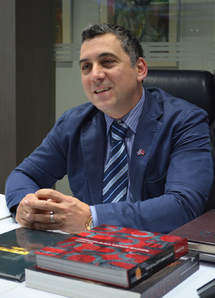
Arto Artinian in focus
Current positions
• Honorary Consul of the Republic of Armenia to the Kingdom of Thailand
• President of Armenian Thai Chamber of Commerce
• Vice President - Armenian Jewellers’ Association International
• President and CEO Artinian Co., Ltd.
Education
• Graduate of Melkonian Educational Institute – Secondary Boarding School, Cyprus.
• Associate | BBA at the Ioannis Gregoriou School of Business Administration, European University Cyprus
Professional Experience
Arto Artinian is the founder, President and CEO of Artinian Co., Ltd. an accredited BOI company specializing in high-end jewellery design and manufacturing, employing more than 350 professionals in Bangkok. He is also owner and director of subsidiary companies in Dubai and Hong Kong and a Managing Partner of SAV & Co., a jewellery branding and distribution-agent company in Canada.
Mr Artinian is the Vice President of International Armenian Jewellers Association, and a corporate member of the Thai Gem and Jewellery Traders Association.
Mr Artinian is the founding Chairman of the Armenian -Thai Chamber of Commerce. The Armenian-Thai Chamber is a member of the Joint Foreign Chambers of Commerce in Thailand.
Social Activities
A family man, Mr Artinian is also a keen adventurer and a curious traveler, enjoying his spare time from work exploring and enjoying his experiences with his family and close friends.
Current affairs, cosmopolitan cultures and personal development are his main motivations whereas on a personal level he is a seasoned wine connoisseur and gourmet enthusiast.
He is the treasurer and a board member of the Chaîne des Rôtisseurs Baliage Thailand, as well as a Cofounding member of the Kiwanis Bangkok Club, a charity organization dedicated to the education and wellbeing of children.
Mr Artinian is married to Mrs Sirin Artinian. They have a son, Serge, and a daughter, Ariana.
ARMENIA AT A GLANCE
The Republic of Armenia is a landlocked country of rugged mountains located in the southern Caucasus between the Black and Caspian seas covering 29,743 square kilometers, most of it above 1,800 meters. Armenia borders Georgia, Iran, Turkey and Azerbaijan.
The population is about 3.2 million, about 1.3 million of whom live in the capital of Yerevan. Other major cities are Gyumri, Vanadzor and Vagharshapat.
The president is the head of state, elected for a five-year term. President Serzh Sargsyan was re-elected in 2013.
The National Assembly is the top legislative body in Armenia elected by popular vote for a five-year term. The executive power is exercised by the government that consists of the prime minister and the ministers.
Armenia is considered to be the first country to officially accept Christianity, in 301 AD.
The country possesses small deposits of alumina, copper, gold, molybdenum and zinc. The main agricultural products include dairy, fruits, fish and livestock.
Major industries are diamond-processing and jewelry manufacturing, software development, consumer products such as natural fruit juices, dried organic fruits, viniculture and winemaking; and, of course, Armenia is renowned for its award-winning brandy.
Additional national conventional industries include electric motors, tires, shoes, silk fabric, chemicals and mechanical instruments.
With many monuments and natural wonders including mountain caves and hot springs, Armenia is a popular tourist destination.
Current positions
• Honorary Consul of the Republic of Armenia to the Kingdom of Thailand
• President of Armenian Thai Chamber of Commerce
• Vice President - Armenian Jewellers’ Association International
• President and CEO Artinian Co., Ltd.
Education
• Graduate of Melkonian Educational Institute – Secondary Boarding School, Cyprus.
• Associate | BBA at the Ioannis Gregoriou School of Business Administration, European University Cyprus
Professional Experience
Arto Artinian is the founder, President and CEO of Artinian Co., Ltd. an accredited BOI company specializing in high-end jewellery design and manufacturing, employing more than 350 professionals in Bangkok. He is also owner and director of subsidiary companies in Dubai and Hong Kong and a Managing Partner of SAV & Co., a jewellery branding and distribution-agent company in Canada.
Mr Artinian is the Vice President of International Armenian Jewellers Association, and a corporate member of the Thai Gem and Jewellery Traders Association.
Mr Artinian is the founding Chairman of the Armenian -Thai Chamber of Commerce. The Armenian-Thai Chamber is a member of the Joint Foreign Chambers of Commerce in Thailand.
Social Activities
A family man, Mr Artinian is also a keen adventurer and a curious traveler, enjoying his spare time from work exploring and enjoying his experiences with his family and close friends.
Current affairs, cosmopolitan cultures and personal development are his main motivations whereas on a personal level he is a seasoned wine connoisseur and gourmet enthusiast.
He is the treasurer and a board member of the Chaîne des Rôtisseurs Baliage Thailand, as well as a Cofounding member of the Kiwanis Bangkok Club, a charity organization dedicated to the education and wellbeing of children.
Mr Artinian is married to Mrs Sirin Artinian. They have a son, Serge, and a daughter, Ariana.
ARMENIA AT A GLANCE
The Republic of Armenia is a landlocked country of rugged mountains located in the southern Caucasus between the Black and Caspian seas covering 29,743 square kilometers, most of it above 1,800 meters. Armenia borders Georgia, Iran, Turkey and Azerbaijan.
The population is about 3.2 million, about 1.3 million of whom live in the capital of Yerevan. Other major cities are Gyumri, Vanadzor and Vagharshapat.
The president is the head of state, elected for a five-year term. President Serzh Sargsyan was re-elected in 2013.
The National Assembly is the top legislative body in Armenia elected by popular vote for a five-year term. The executive power is exercised by the government that consists of the prime minister and the ministers.
Armenia is considered to be the first country to officially accept Christianity, in 301 AD.
The country possesses small deposits of alumina, copper, gold, molybdenum and zinc. The main agricultural products include dairy, fruits, fish and livestock.
Major industries are diamond-processing and jewelry manufacturing, software development, consumer products such as natural fruit juices, dried organic fruits, viniculture and winemaking; and, of course, Armenia is renowned for its award-winning brandy.
Additional national conventional industries include electric motors, tires, shoes, silk fabric, chemicals and mechanical instruments.
With many monuments and natural wonders including mountain caves and hot springs, Armenia is a popular tourist destination.

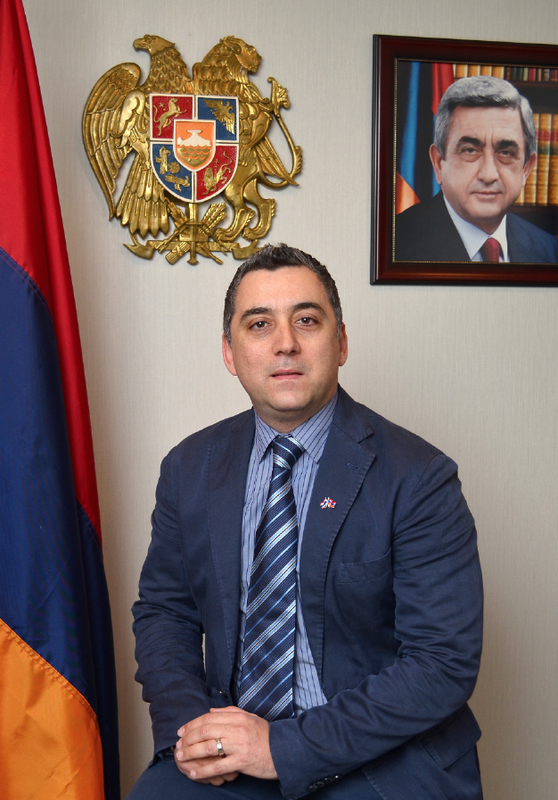
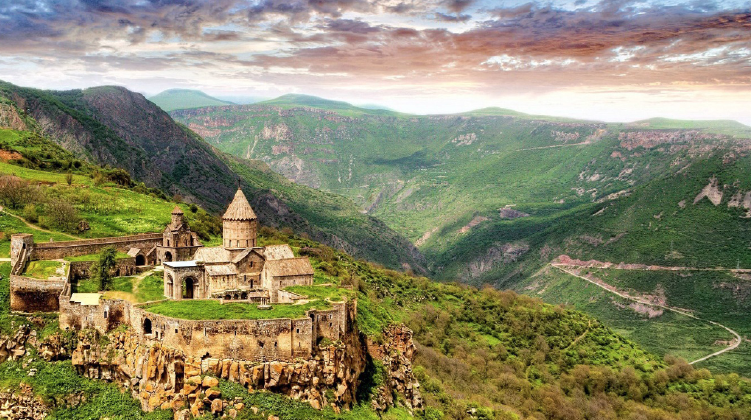
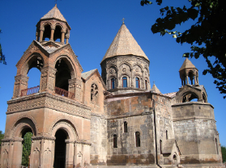
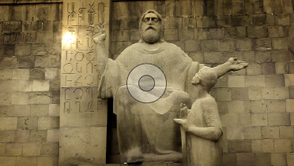
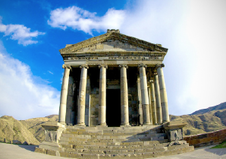
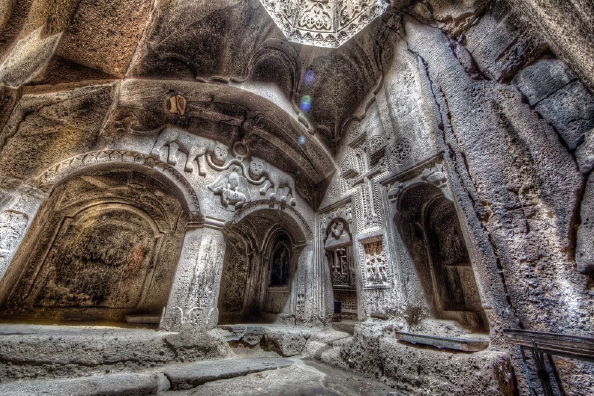
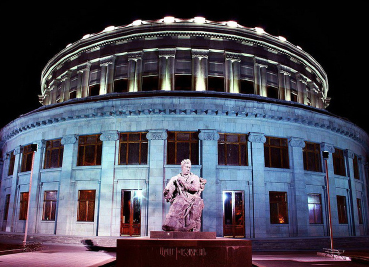
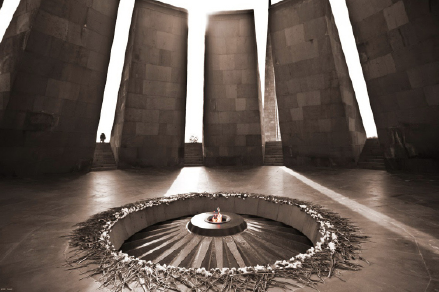
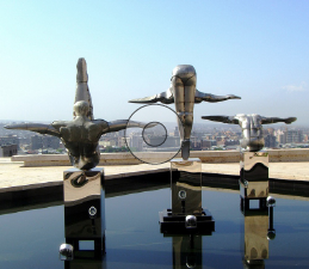
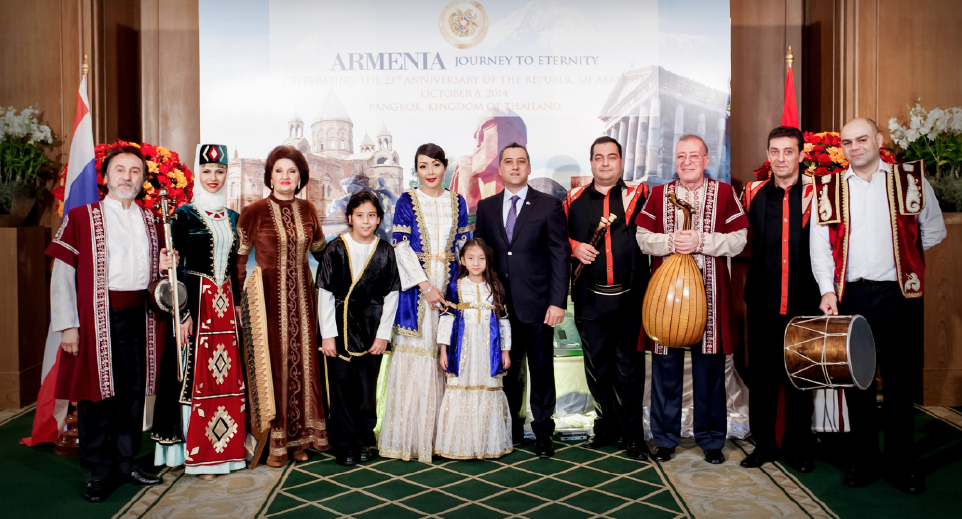
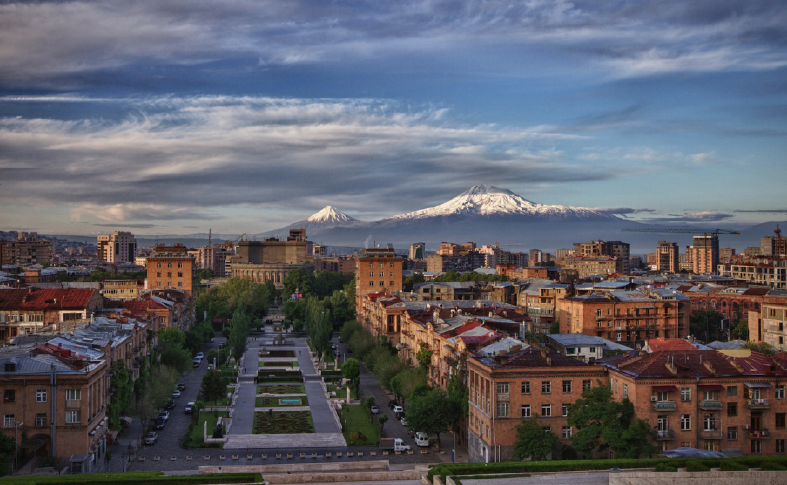
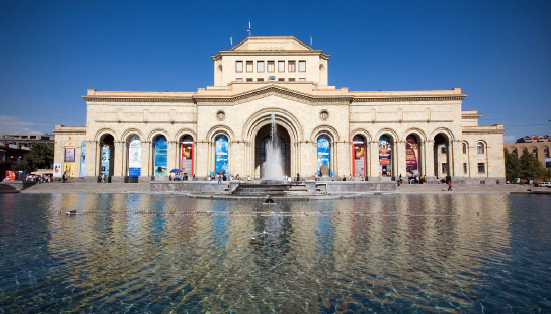
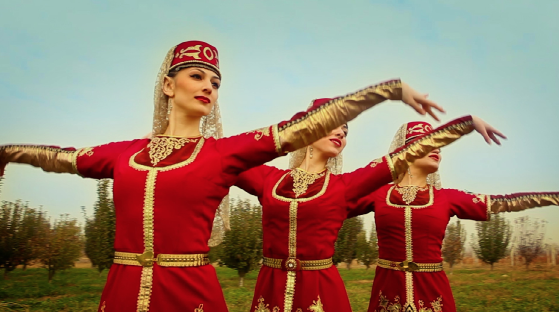
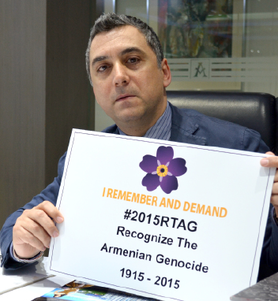
 RSS Feed
RSS Feed
















